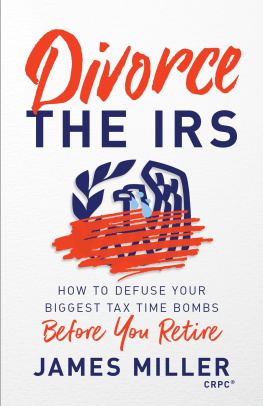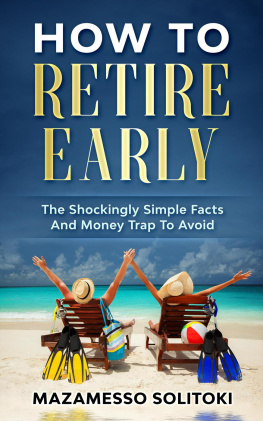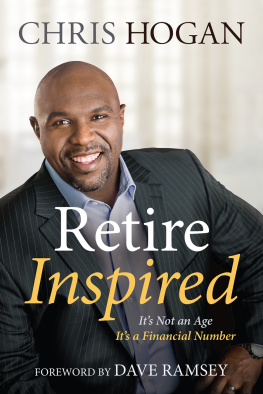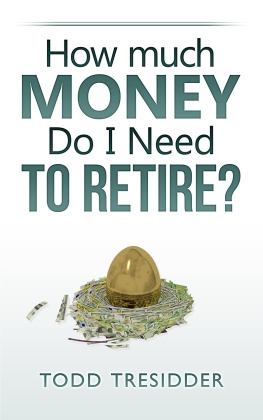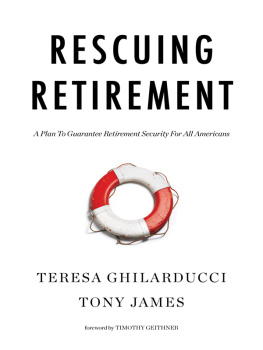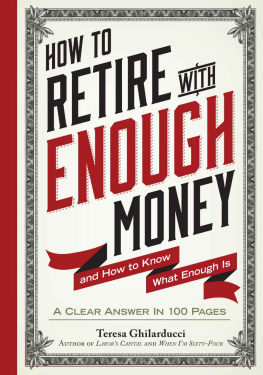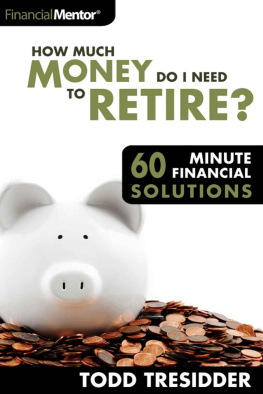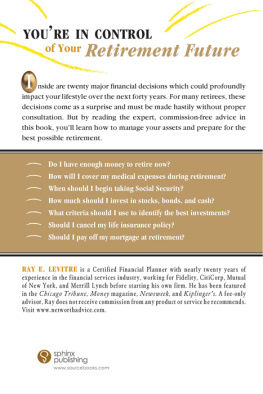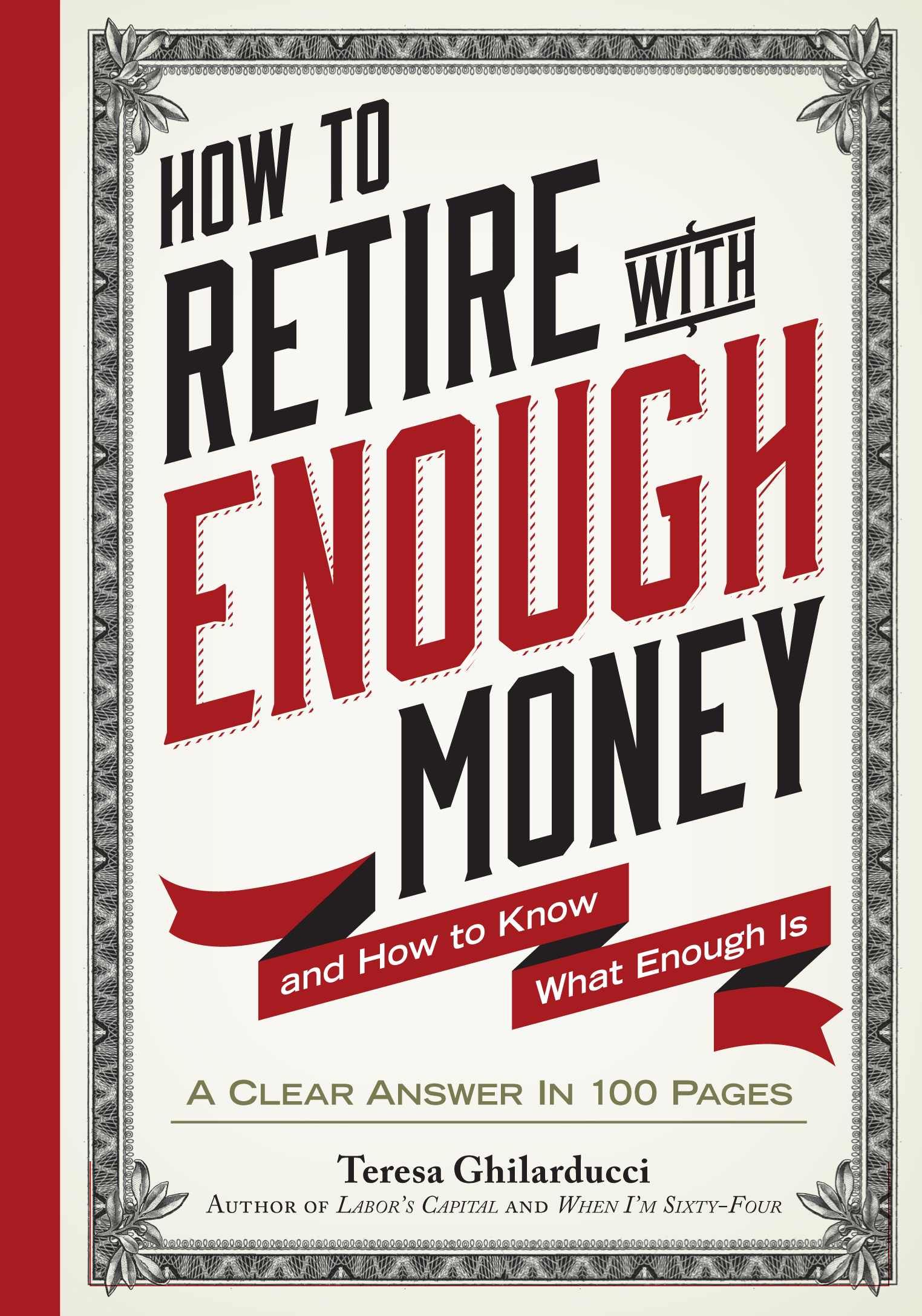
How to Retire with Enough Money
and How to Know What Enough Is
Teresa Ghilarducci
Workman Publishing
New York
T his book is dedicated to my mother,
Marion Ghilarducci , and my son, Joseph ORourke , who strive every day on both ends of my generation to make their way and help others.
Contents
Acknowledgments
I would like to acknowledge the extraordinary debt to the people who wrote me long emails about their personal financial situationsI read them all more than onceand the adults who, despite working all day, took my economics classes at night and on Saturdays at San Francisco City College, union halls in Chicago, West Virginia, Detroit, Pittsburgh, South Bend, and churches all over the country, who taught me so much about personal responsibility and the dedication to a dignified life.
I would not have been able to do my work without the continued support and encouragement from my agent, Barney Karpfinger. My editor, Suzanne Rafer, was a gentle and firm hand making the manuscript a book. My biggest debt is to Jodi Compton, novelist and friend, who helped write the book. Ive talked to my friend Chris Tiedemann about money since we were 11. I wouldnt think this way without her.
My husband, Rick McGahey, is my love and partner and helps me even when he doesnt know it.

Introduction
Welcome to the do-it-yourself system of retirement planning in America! Waityou did know youre in a DIY system, right? On average, Social Security replaces about 40 percent of the income you earned before retiring. Its up to you to arrange the rest. Intimidated? Dont be! Planning a prosperous retirement is easy, if you follow these six simple steps:
First, predict when you and your spouse or partner will retire, be laid off, or be physically and mentally unable to keep your job.
Second, predict when you will die.
Third, save more than 7 percent of every dollar you earn, starting when youre 25. Oh, youre 55 now? Just save 30 percent of every dollar!
Fourth, earn at least 3 percent above inflation on your investments, every year. How? Find the best funds for the lowest price and optimally allocate them. Dont forget to get out just before a financial crisis, and get back in just when the crisis has bottomed out.
Fifth, do not withdraw any funds if you lose your job, have health troubles, get divorced, buy a house, or send a son or daughter to college (or bail him or her out of jail if you dont have an honor-student type of kid).
Sixth, time your retirement account withdrawals so that the last cent isnt spent until the day you die.
See, its easy!
Of course, the truth is that its not easy at all. The 401(k) account, which ushered in the do-it-yourself era, has been with us since 1978, and heres how its worked out so far. As of this writing, the majority of Americans over 50 have $30,000 or less saved for retirement. A third of them have nothing saved. Forty-nine percent of middle-class Americans are on track to be living in or near poverty after they quit working. Theyll have a food budget of about $5 a day.
These are sobering figures. By 2030, the last of the baby boomers will be 65. Right now, 12 percent of the population, or about 43 million people, are over age 65; by 2030, almost 73 million, more than 20 percent, will be. The population, in general, will grow, but the over-65 segment will grow faster. From now until 2030, more than 8,000 Americans will reach age 65 every day. Even if poverty rates for the elderly stay the same as they are today, the sheer numbers of elderly poor will be at record highs: more than 5 million, up from 3 million in 2010.
The bottom line: Too many people are facing a future in which theyll have to keep working indefinitely. Theyll be dependent on an uncertain job market and on government programs perpetually threatened by budget cuts. Theyll be living on someone elses terms.
Because I am an economist, people tell me their intimate money issues. The smartest people have fantasy-based retirement plans.
How do I know all this? Because Ive spent my professional life studying the economics of retirement. Its been my specialty as a professor of economics, first at the University of Notre Dame and now at the New School for Social Research in New York City. I also have more than 20 years of practical experience: I was a presidential appointee to the Pension Benefit Guaranty Corporation that insures traditional pensions for 40 million workers and a gubernatorial trustee of the $12 billion Indiana Public Employees Retirement Fund. Im currently a trustee of a retiree health-care fund of more than $53 billion, which provides for just under a million employees benefits for former steel and auto workers.
Because of my professional bona fides, friends often talk to me intimately about their finances. Im happy to have these conversations, but what I hear worries me. Smart, educated people would rather put money into exotic and risky investments than pay off a loan thats costing them interest every day. They get their ideas about money from screaming headlines, hot tips, and overheard conversations. Or they trust their money to inadequately trained financial managers and brokers paid on commission.
Case in point: Not too long ago, a man earning well over $130,000 per year confided to me at a dinner party that he had $300,000 in assets for retirement, plus a traditional pension. This man thought he hadnt saved enough to be able to maintain his current lifestyle. I mentally estimated his mortality, knew he had Social Security, and figured that he didnt need to worryprovided he died sooner than he expected (which I thought he would, because he was a heavy smoker with a stressful work and personal life). Congratulations, sort of.
An early death shouldnt be anyones first line of defense against poverty. But for too many people, it is. Many dont even have what that dinner-party guest hada six-figure savings balance and a pension. To repeat what I said above, a majority of Americans nearing retirement age have less than $30,000 saved for retirement. And for most people, an old-fashioned pension is a thing of the past.
To put that in perspective, consider this: To retire at a standard of living similar to the one he or she has during their working lives, the average person with no other retirement plan besides Social Security will need eight times his or her annual salary in retirement accounts. What that adds up to will vary, since 90 percent of American working households live on an amount between $20,000 and $190,000 per year. For a household living on $50,000 per year, that means $400,000 in actual assets or an annuity equivalent. But a couple wanting to live on $190,000 per year starting at age 65 will need a lot more$1.5 million.
What is an annuity?
An annuity is a payment that lasts a lifetime. It pays a steady benefit each month for the rest of your life, no matter how long you live. The size of the benefit depends on the account balance. If you opt for a spousal annuity, your benefit will be lower, but if you die before your spouse, he or she will be paid benefits for the remainder of his or her life.
What I said earlier is so important, Im going to repeat it yet again: The majority of Americans have less than $30,000 saved, and a third of Americans have nothing at all, although they need approximately $160,000 (for those earning $20,000 yearly) to $1.5 million to supplement Social Security. Its an enormous shortfall. Furthermore, money for basic expenses is not all people need in retirement. Theyll need to pay for the medical expenses that Medicare doesnt cover. The average middle-class American knows thathowever, she estimates she needs about $47,000 for out-of-pocket medical costs in old age, when in reality, the figure is closer to $250,000. Phrased differently, a quarter of a million dollars. Sounds a lot scarier that way, doesnt it?
Next page

